Gerry Adams's Blog, page 78
February 2, 2012
Slán
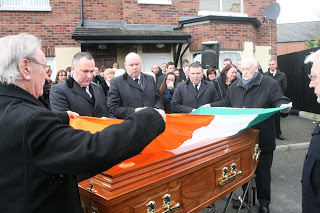
Wee Harry was buried yesterday. Hundreds of his friends and comrades from all parts of the island and further afield came to pay their final respects to a good friend, a generous friend, a hero.
Martin McGuinness paid a wonderful tribute to Harry earlier in the day at the mass that was celebrated by Fr. Matt Wallace. Grainne Holland gave fine renditions in Irish and English.
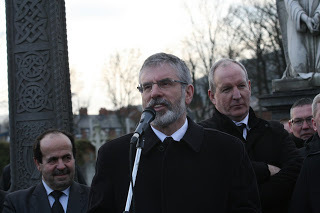
Here's some of what I said:
"This is St. Brigid's day, the celtic day, the first day of spring. St. Brigid was a mighty woman and it's very appropriate because Harry had a great grá for the women in his life, and for Irish women in struggle.
The big loss here is Kathy's and I want to acknowledge her mother who is here as well. Harry called her granny. And other brothers and sisters of Kathy who are here also.
Harry's immediate family; his brother Tony the Master, Seamus, John and Joe and his sister Lily.
And then Áine and Tommy and KC. And Máire and Kieran, Gabrielle and Harry óg; Ellen and Steve, Louise, Niall and Niamh with Colin, and Kieran eile with Mairead, and Aisling with the Wolf.
I knew Harry over 40 years and for those of you who were in the chapel Martin McGuinness spoke for me in all that he said; except that he said that I wasn't a good singer and Harry actually thought I was a brilliant singer.
Harry was also Colette's best friend.
That friendship was forged in the dark days after Kathleen Largey died. Harry was left with Áine and Máire, and Colette was there with Gearoid and the three of them were reared to a large extent together.
Everybody here has their own little story to tell about Harry. But in all the ins and outs, and ups and downs of our lives, as Martin said of his clann, and of my family's life, our lives have been tied up with his.
A year or so after Kathleen's death he went down to Galway. And what could a fella do. Her hair was blond and her eyes were blue; and that was it and along came five more.
Kathy must have the heart of a lioness. She didn't know the north.
Belfast was a city under occupation at that time. Collusion was going full blast.
And even worse she had to take on Áine and Máire.
She did and she came to live among us.
And I have to say that in the last months she has been a rock, for Harry, for all of us and for her family.
She is one mighty woman.
Harry was born in 1944, which was less than 30 years after the 1916 Rising.
He was from Ballymacarrett and that stayed with him.
At the time of partition the people of that little community had been abandoned but they were such a resilient and versatile people.
The 'master' (his brother) taught him his trade.
He became a plumber and was active in the trade union movement.
Now this was the 60s. Belfast was a mean city.
Harry started to be influenced by members of the old communist party some of whom worked in the shipyard and was on May Day marches.
He joined the Army but always retained that sense of acute progressive social consciousness.
And the notion that all struggle is about people, particularly working people.
He also retained friends from amongst our protestant and unionist neighbours.
Through all the 30 years of conflict there would be someone in Harry's house visiting from Sandy Row, or the lower Shankill or the Donegal Road or East Belfast.
He had a great gift for friendship.
One of the things he taught me is that friendship is greater than anything else; more important than anything else; transcends anything else. Is bigger than politics. Bigger than differences.
And he had a gift of giving that friendship to people and of connecting to people in a very quiet and unassuming way.
We were in jail together for a short time. And like many others there are lots of stories of our time behind the wire. But its too cold today to take you through those.
Harry travelled with me a wee bit in more recent times.
He bought me a big green coat when we were going to Downing Street so that we would look ok when we were meeting the Brits. He bought Martin McGuinness a big black coat.
And then when I was elected the TD for Louth he bought me this coat because he thought the other one was looking a bit threadbare.
He was generous to a fault.
He must have been the worst businessman in the world. Because he was always helping people. Very frequently when work needed to be done in the house, and I hope no one takes offences at this, he would engage recovering alcoholics, recovering gamblers and recovering republicans, with very limited skills to do plumbing and renovation and other repairs.
We went to Gaza most recently. It's a brutal place. Worse than anything ever happened here in this city.
I can't think of circumstances except in Cromwellian times here that people are being treated in Gaza City and the Gaza strip.
We stayed for a couple of days and we met dozens of groups and we were very well receuived.
And we had to go and meet the Prime Minister Ismail Haniy of Hamas and of course he was target for attack by the Israelis so we were taken away secretly to meet him.
And our delegraiton presented themselves. Ted Howell, Sinn Féin; Richard McAuley, Sinn Féin. And all the Palestinians looked over to Harry and he said I'm their military wing.
So, I'll miss him a huge amount, and so will Colette, and so will Gearoid but of course as I said at the beginning the big loss is Kathy's.
The girls - Harry had a special unique relationship with every one of these seven girls and also with the twin, and with Nicky.
It's a sign of the man that he was able to do that.
We were walking, myself and Bill and Tangus and Brendan and Harry used togo for a walk on the Hill up here behind us and he couldn't get a breath.
That's how we knew he was sick.
A friend of mine who isn't a republican but has a huge affection for Harry said he'll get six months if he's lucky and that's when it hit me like a sledge hammer.
And Harry faced up to that. He could have his ups and downs. He could be a bit depressed in himself at different times but he was a star.
He was a hero.
He prepared everybody for what was coming.
And on Saturday last we had a big Uniting Ireland conference in Derry and Harry had wanted to go and of course he wasn't well enough.
And I went up to see him before we went.
And when we were driving up I wrote this little verse:
Ar an slí go Doire
Daichead bliain i ndiaidh Domhnach na Fola
Níl Harry liom
Bhí sé ina luí i mBéal Feirste ar maidin
Ag caint faoi sean uaireanta liom
'S é ag fanacht sa bhaile anois
Ag fanacht is ag fanacht
Agus muidinne ag dul trasna ag Kyber Pass go Dungiven
Sneachta ar na sléibhte
Agus an spéir liath le fearthainn
Is Ted ina chodladh, Tangus ciuin, is Bill ag tiomaint
Ar an slí go Doire
Gan Harry
Tá súil agam go mbeidh sé ann nuair a thiocfaidh muid arais arís
Daichead bliain i ndiaidh Domhnach na Fola
Harry died well.
We were all with him.
And he died bravely.
He also said to me – because he could be quite caustic at times – youse will not be too long behind me.
I hope he's wrong about that.
To Kathy and especially to the girls and the gar paistí – your Daddy was great – your Daideo was brilliant – your husband was wonderful your brother was smashing.
Ní chifidh a leitheid an arís.
Slán Harry
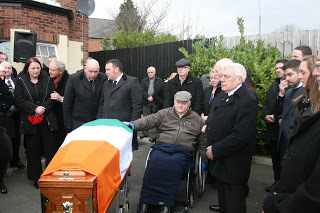
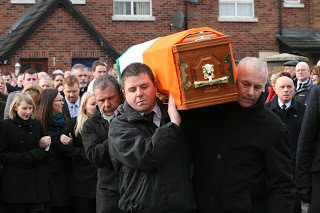
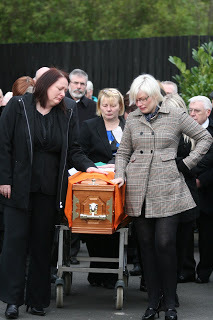
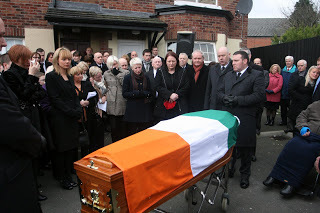
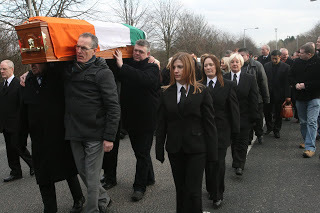
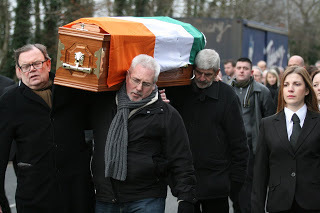
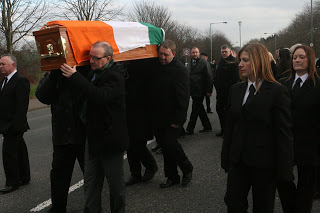
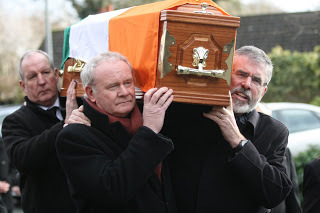
Published on February 02, 2012 19:06
February 1, 2012
Ravensdale Residents reject septic tank legislation
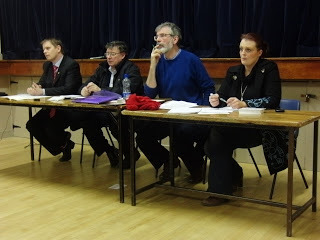
Councillor Tomás Sharkey, Councillor Jim Loughran, mise agus Councillor Edel Corrigan
Monday night was cold. Then that could be said of most nights recently. But it was especially sharp in Ravensdale, in the Cooley Mountains, on the border between south and north.
Ravensdale is one of those idyllic places. It's full of history and culture. A mix of mountain, forest, long walks and a peninsula surrounded on three sides by water. On the north by Carlingford Lough. To the east by the Irish Sea, and to the south by Dundalk Bay.
I have been in and out of it for decades and I never tire of driving or walking its roads and lanes.
And like many rural parts of the south many local residents depend on septic tanks to deal with sewage waste and are now facing additional costs and the possibility of significant bills for upgrading or replacing these systems.
This blog wrote about this issue a few weeks ago. I return to it briefly because on Monday night over 100 people braved the cold and packed into Ravensdale Community Centre for a public meeting on septic tanks organised by Sinn Féin.
It was an opportunity for the shinners to set out our efforts on this issue, listen to the views of those directly affected by the government's legislation and to plan for future action.
Local councillor Jim Loughran opened the community centre, turned on the heating, helped set out the seats and then chaired the meeting. Councillors Edel Corrigan and Tómas Sharkey joined this blog on the platform.
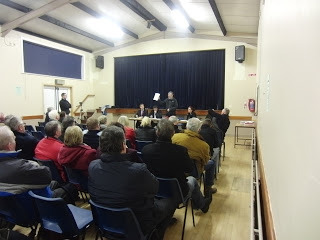
The meeting lasted just over a hour. It was clear from the outset that people are angry.
Angry that the government is foisting another charge on families already faced with a host of other stealth taxes from the household charge to the universal social charge to VAT increases and more.
Angry that urban communities have seen billions of euro put into improving or constructing new waste water systems – which rural taxpayers helped pay for – while rural dwellers are expected to carry the financial burden on septic tank improvements.
Angry that the EU Waste Directive (75/442/EEC) regarding domestic wastewater disposed of via onsite wastewater treatment systems, was imposed in 1975 and despite Fianna Fáil and Fine Gael and Labour all having been in power since then they did nothing about it.
Angry that the government, which was elected in part on a commitment to be more accountable, open and transparent, refused to listen to the concerns of rural dwellers, ignored the arguments and amendments put by the opposition parties and guillotined the Dáil debate and rushed through the Water Services legislation.
Everyone at Monday night's meeting recognised the need to protect our environment, our water and the health and welfare of citizens. No one had any objection to registering septic tanks and inspecting and upgrading where necessary.
But to force rural households to bear the financial brunt of this when billions of public money was spent on urban systems and at a time when families are finding it difficult to make ends meet, was criticised by speakers as discriminatory and inequitable.
In my contribution to the conversation I explained that the government will publish in February the date for the commencement of a four week consultation period. Sinn Fein will make a submission to the consultation which will call on the government to:
• Provide clear standards to be applied to septic tanks.
• The need for a fully funded grants scheme.
• Withdraw the threat of criminalising rural communities.
It is very important that the government receive thousands, tens of thousands of submissions from groups and individuals. I asked those in Ravensdale to make submissions to the Consultation once the date and its remit is known and to encourage their relatives and friends and neighbours to do the same. Some said they would organise public meetings. They also agreed to lobby Fine Gael and Labour TDs, and the Minister for the Environment.
The legislation may have been passed but the campaign around the rights of rural dwellers and septic tank charges is far from over.
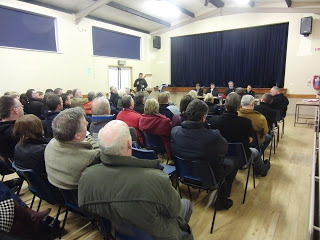
Published on February 01, 2012 12:02
January 30, 2012
'Wee' Harry Thompson

Harry Thompson

Richard; wee Harry and Gerry at the separation Wall in Bethlehem
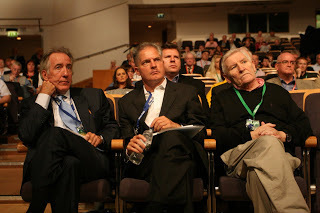
Congress member Richie Neal; Billy Tranghese and wee Harry at the Sinn Féin Ard Fheis in the Waterfront last September
Harry Thompson died yesterday at home surrounded by his family and friends.
I have known wee Harry for over 40 years. We were always close.
Harry was a republican activist for most of his adult life. He was a very proud son of Ballymacarrett in East Belfast. He was born in Bryson Street in 1944, the youngest of eight sons and two daughters to Elizabeth and Arthur Thompson.
At 15 he left school and went to work as an apprentice in the heating and plumbing trade. He claims that during this time he worked in every hospital in Belfast.
In 1962, as the 50's campaign was coming to an end, Harry joined the republican struggle. He was recruited into the IRA by Liam Mulholland, who was himself a well known and long standing republican activist. Liam had been involved in the Tan War and in every subsequent campaign and was one of over a hundred republican prisoners who escaped from Dundalk prison during the civil war when its wall was breached in an explosion.
Harry was also active in the Sinn Féin. In 1964 Sinn Fein was a banned organisation. But the party stood candidates in the October Westminster general election campaign under the banner of 'Republican' in each of the 12 constituencies. Harry was active in east Belfast where David McConnell was the candidate. They won almost 2,000 votes to add to the just over 100,000 total taken across the north.
Despite a credible 15.9% of the vote for republican candidates the 1964 election is best remembered for Ian Paisley's threat to take the Tricolour out of the election office window in Divis Street and for the days of rioting that followed the violent removal of the national flag by the RUC.
Harry remained active throughout the sixties. It was a turbulent time within Irish republicanism as efforts were made to learn the lessons of the failed 50s campaign and to map a new way forward.
At the end of that decade Harry briefly went to England. On his return in 1971 he was soon back in the thick of the struggle. In 1973 he was involved in establishing Green Cross which over the years did amazing work in providing financial and other support for the families of political prisoners.
In 1974 he was interned and he was held in Long Kesh until December 1975 when he was among the last of the internees to be released.
In June 1976 Harry married Kathleen Largey, who was the voice of The Flying Column, and one of the finest ballad singers of her generation.
Kathleen, a member of Cumann na mBan, sang patriotic songs and ballads that told the story of heroic resistance to the British military occupation in Ireland.
Her first husband Eamonn Largey was killed in a car accident in July 1973. He and Kathleen had two daughters. Áine was about 18 months old while Máire was six weeks.
Harry and Kathleen married shortly after she had been diagnosed with cancer. He was a devoted husband and father to the two girls and together Harry and Kathleen worked hard in support of the political prisoners. Kathleen died in February 1979.
Throughout this time Harry remained a full time activist. He was also a small businessman working in the leisure industry.
In 1980 he moved to Galway where he stayed active in the republican struggle.
Four years later he married Kathy Lydon, a Galway woman and they moved back to Belfast. Harry and Kathy have five beautiful daughters over whom Harry doted; Ellen; Louise; Mairead; Niamh and Aisling.
He and Kathy were also blessed with three grandchildren – Harry óg, Gabrielle and K.C. He is also survived by his sister Lily, brothers Seamus, Tony the Master, Joe and John.
From then until now Harry has remained an active republican. He was a trusted friend. When John Hume and I started our talks in the 1980s we used to meet regularly in Harry's home.
He has travelled with me to the USA, to meetings in Downing Street, and three years ago he was part of a Sinn Féin delegation which visited the Middle East, including Gaza.
Harry was very well known in republican circles throughout Ireland. He was a quiet, soft spoken unassuming person but was fierce in his support and advocacy of the republican struggle, and totally dedicated to its successful conclusion.
On behalf of republicans everywhere I want to extend my deepest condolences to Kathy, Áine, Máire, Ellen; Louise; Mairead; Niamh and Aisling.
Go ndeanfaidh dia trocaire ar a n'anam dílis.
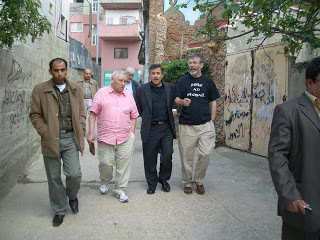

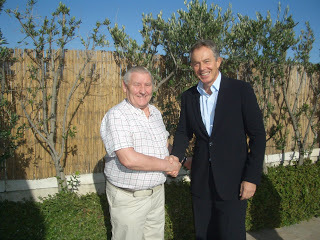
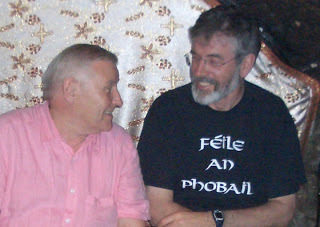
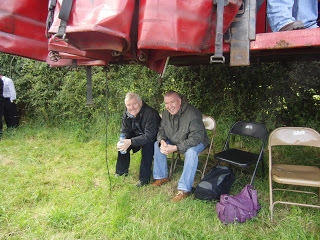
Published on January 30, 2012 12:21
January 29, 2012
Bloody Sunday – The untold story
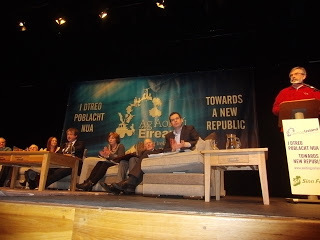
This weekend I was in Derry. Sinn Féin held the latest of our very successful Uniting Ireland conferences which drew a capacity crowd in the Millennium Forum.
Derry is a beautiful city, full of history and culture and art. And the people are great.
But for many people, particularly in the USA, the name Derry is synonymous with the terrible events that occurred there on January 30th 1972. On that day – exactly 40 years ago – British Paratroopers shot dead 14 civil rights marchers and wounded others in what has passed into history as Bloody Sunday.
For the 39 years following that atrocity the families and the people of Derry campaigned for truth and justice for those who died and were injured. At great personal cost they organised and marched and lobbied.
In this they received invaluable support from Irish America. Noraid, the AoH, Clann na nGael and many others enthusiastically and relentlessly lobbied US politicians. Irish people throughout the globe and Irish America in particular in the Arts, academia, the labour movement supported the families.
Motions of support were passed in local and state legislatures and hearings were held in Washington. It was a long drawn out battle as successive British government's lied, opposed, and obstructed every effort by the families to get the truth.
The British Widgery Inquiry had blamed the organizers of the march, the victims and the IRA. Widgery accused the dead of being 'gunmen and bombers'. According to the British the Paras actions were legal.
The Saville report in June 2010 finally binned that lie and established that the victims were innocent. The Saville report was a vindication for the families who had campaigned for so long. It also concluded that the organizers of the march were not to blame for what happened. Saville decided that the IRA or members of the IRA had not taken any action that precipitated events.
Saville acknowledged that British soldiers fired the first shot and continued firing without any provocation. He dismissed any suggestion that soldiers acted out of panic or fear or confusion. Their actions were "unjustified and unjustifiable".
But Saville 's conclusions are not the end of the matter. It is clear that the report tries very hard to limit blame for what happened to the soldiers on the ground who carried out the killings. In doing so it seeks to exonerate their military and political masters.
And it is here that Saville fails. The report makes only a tokenisitic nod towards the British Army command and there is minimal criticism of the Para commander who was present in Derry.
The reality is that the Paras were acting within a political and military regime constructed by their political masters and by the top generals.
In the months before Bloody Sunday a secret British Cabinet committee – GEN 42 - had been discussing policy in the north. It was chaired by the British Prime Minister Ted Heath. It involved senior British Army figures and senior politicians, including Quentin Hogg, Lord Hailsham, who was on the far right of the Tory party, and was regarded as a hard militarist.
In 1971, during an interview in which he was asked about US Senator Ted Kennedy Hailsham had banged the table with his fist and cried; "Those Roman Catholic bawstards! How dare they interfere!"
Over 20 years later Michael Carver, who had been the British Army Chief of the General Staff, and was a member of GEN42 at that time, admitted that Heath had wanted soldiers to be able to shoot citizens irrespective of whether they were armed or not.
He claimed that Heath had been told by Hailsham, who as Lord Chancellor was the head of the British judiciary, that this was legal.
During a meeting of GEN42 on October 6 1971 – four months before Bloody Sunday - it is reported that Heath said: "the first priority should be the defeat of the gunman by military means and that we would have to accept whatever political penalties were inevitable".
Mindful of the public and international response to state killings and the legal consequences GEN 42 debated at length how best to cover-up any killings with Carver arguing that in a colonial situation the British army restores order but not law and order. It was therefore free to do whatever was necessary to protect British interests.
Others didn't like this approach. So Hailsham suggested that citizens involved in rebellion or who resisted state measures to deal with that rebellion, were guilty of treason and therefore the state was free to deal with them.
All of this dovetailed into the approach being articulated by Britain's foremost military strategist Frank Kitson. He had served in almost every colonial war fought by the British after World War 2 including Belfast in the early 70's. Kitson defined the 'enemy' as subversives and insurgents and subversives included people who seek political change or reform by peaceful means.
He argued that to win the state must bring together all of its resources and agencies into one overarching strategy. These included everything from law and order, through policing, to government departments like planning and education, to propaganda and the manipulation of the media. Everything had to be subservient to the needs of achieving a military victory, including killing citizens.
This was the political and military climate in which General Robert Ford, who was the British Commander of Land Forces in the north of Ireland, wrote a memo after visiting Derry on January 7 1972.
In his memo Ford states that he is "coming to the conclusion that the minimum force necessary to achieve a restoration of law and order is to shoot selected ringleaders amongst the DYH (Derry young hooligans)".
In Derry on January 30 1972, a senior correspondent from the London Times was standing next to Ford when paratroopers were ordered into the Bogside. Brian Cashinelle reported Ford, waving his swagger stick and shouting "Go on the Paras, go and get them, go on, go and get them".
However, in his report Saville ring-fences blame around the small number of Paras who shot the marchers and attaches no blame to the generals and the politicians who made it happen. That is a fault. Especially when one considers the role of the British state in collusion, and in other similar atrocities like the Dublin and Monaghan bombings and the Ballymurphy Massacre.
It is also worth noting that Hailsham's son Douglas Hogg was the British Minister who in 1989 claimed in the British Parliament that there were solicitors in the north who "unduly sympathetic to the cause of the IRA". Weeks later human rights lawyer Pat Finucane was murdered by a UDA death squad made up entirely of British Army and RUC Special Branch agents!
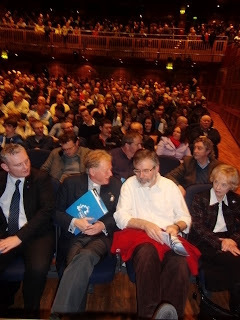
Finally, the weekend's Uniting Ireland conference in Derry demonstrates the great resilience of the citizens of that fine city and the work that is going on to unite and re-imagine a new Ireland.
It is also proof that British military policy – including the murders of Bloody Sunday have failed. For that we give thanks to the Bloody Sunday families and everyone who supported them.
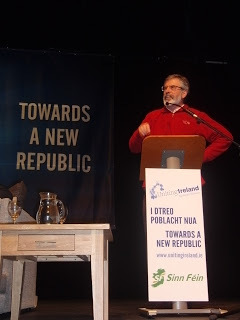
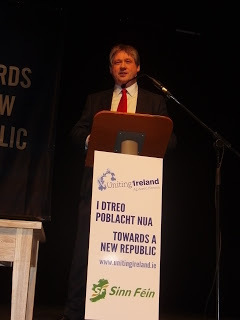
Published on January 29, 2012 17:35
January 25, 2012
Attacking rural communities
There are many issues exercising the minds of citizens in this part of the island at this time. Today, Wednesday, the government will hand €1.25 billion of taxpayers money over what are called unsecured, unguaranteed bondholders. These are people who bought bonds in Anglo-Irish bank when the boom times were booming on the basis if it all went belly up there was no moral or legal obligation for them to be paid back.
They are financial gamblers on the world economic market.
The Fine Gael and Labour government are insisting that they must be paid. The deference being shown attached to these bondholders by the government contrasts sharply with its attitude to citizens. It is also at odds with what it said was its attitude before last year's general election.
One year ago, in January of last year, Labour leader Eamon Gilmore criticising the then Fianna Fáil Taoiseach Brian Cowen, said: 'If the Taoiseach's government knew Anglo Irish Bank was insolvent and he asked the Irish taxpayers to bail it out and to pay the cost we are now paying for it, that was and is economic treason."
If it was treason for Cowen why is it not treason for Kenny and Gilmore? They know that Anglo Irish is a toxic bank. They know the huge financial burden it is imposing on citizens. €4 billion was given by Fianna Fáil to Anglo in 2009; €3.1 billion was given last year; and €3.1 billion will be given in March. That's over €10 billion of taxpayers money being paid over to a criminal bank that is now dead. By 2031 the total cost will be close to €80 billion.
To put this in context. Just before Christmas the government cut huge swathes of money out of the health system. The impact of this means the loss of 3.300 jobs, the closure of up to ten public nursing homes, and the loss of half a million home help hours. Yesterday Gerry Burke, a Consultant Obstetrician in Limerick warned that the loss of 47 midwives at the Mid-Western Regional Maternity Hospital in Limerick next month may cost lives.
The money that is being given away today would have more than paid for the cuts to health.
And then there is the issue of septic tanks. Not something most readers of the Andersonstown News would be familiar with. Like urban dwellers the length of this island you are connected to a mains sewage system.
But not everyone is that lucky and before I comment further let me declare an interest in this issue in that I have a septic tank – albeit a relatively new one in Donegal.
In this state there are 1,462,296 private dwellings of which 418,033, or just over a quarter, have septic tanks. The Water Services Amendment Bill is expected to be passed by the Oireachtas tomorrow thanks to the overwhelming majority enjoyed by the coalition by Fine Gael and Labour.
The government's legislation imposes a €50 registration fee for a mandatory inspection of septic tanks which is on top of a €100 household charge recently imposed on all households. But this is only part of the story.
There's also the possibility of a €200 fee for follow-up inspections and should the inspections find that the tank is not up to EU standards then those 400,000 plus rural households could find themselves with a repair or replacement bill than could be anywhere between 8,000 and 15,000 euro.
Rural communities are outraged and justly so. In the last decade in the region of €3 billion was spent by the government on waste water services throughout the south. All of it went to providing urban services. What rural dwellers want to know is why is that urban households can have their sewage upgraded out of public monies but they have to pay for theirs. Is that fair?
And it's not as if this issue sneaked up on the government. The EU directive which is at the heart of this issue came into effect in 1975 but successive governments failed to deal with it. But now it's all rush, rush, rush, with the government trying to scare the public and brow beat the opposition parties by claiming that if it fails to pass this legislation by February 3rd the state will be liable to an initial fine of €2.7 million and €26,173 each day after that until it implements the EU directive.
This isn't quite true. The European Commission has said that the European Court of Justice won't make a ruling on this issue until at least the summer and maybe even later than that. So there is time for a proper debate.
Sinn Féin proposed a series of amendments to the government's Bill. Our goal was to remove any cost to the householder by forcing the government to come forward with a fair grants system that would ensure that people in rural Ireland would not have to bear the cost for the failure of successive Governments on this issue.
If necessary the government should apply to the EU for finance which they should match to grant aid households in upgrading their septic tanks.
However, the government moved to guillotine the debate and to close down any proper discussion of this issue.
In addition the Minister for the Environment has added significantly to peoples' worries and concerns by his failure to provide clarity for householders as to what the standards will be that will now be applied to Septic Tanks and Treatment Systems.
In my own constituency of Louth and right across rural Ireland this issue has caused genuine anger amongst people.
It is right that government protects our environment and the health and welfare of citizens. Registering septic tanks makes sense. Inspecting these tanks also makes sense. But to force rural households to bear the financial brunt of this when billions of public money – which rural taxpayers contributed to – has been spent on urban systems is not equitable.
It is not right that rural householders should be discriminated in this way.
There is now a widespread campaign against paying the registration fee and opposing the government's plans. The passing of the Water Services Bill will not be the end of the matter.
They are financial gamblers on the world economic market.
The Fine Gael and Labour government are insisting that they must be paid. The deference being shown attached to these bondholders by the government contrasts sharply with its attitude to citizens. It is also at odds with what it said was its attitude before last year's general election.
One year ago, in January of last year, Labour leader Eamon Gilmore criticising the then Fianna Fáil Taoiseach Brian Cowen, said: 'If the Taoiseach's government knew Anglo Irish Bank was insolvent and he asked the Irish taxpayers to bail it out and to pay the cost we are now paying for it, that was and is economic treason."
If it was treason for Cowen why is it not treason for Kenny and Gilmore? They know that Anglo Irish is a toxic bank. They know the huge financial burden it is imposing on citizens. €4 billion was given by Fianna Fáil to Anglo in 2009; €3.1 billion was given last year; and €3.1 billion will be given in March. That's over €10 billion of taxpayers money being paid over to a criminal bank that is now dead. By 2031 the total cost will be close to €80 billion.
To put this in context. Just before Christmas the government cut huge swathes of money out of the health system. The impact of this means the loss of 3.300 jobs, the closure of up to ten public nursing homes, and the loss of half a million home help hours. Yesterday Gerry Burke, a Consultant Obstetrician in Limerick warned that the loss of 47 midwives at the Mid-Western Regional Maternity Hospital in Limerick next month may cost lives.
The money that is being given away today would have more than paid for the cuts to health.
And then there is the issue of septic tanks. Not something most readers of the Andersonstown News would be familiar with. Like urban dwellers the length of this island you are connected to a mains sewage system.
But not everyone is that lucky and before I comment further let me declare an interest in this issue in that I have a septic tank – albeit a relatively new one in Donegal.
In this state there are 1,462,296 private dwellings of which 418,033, or just over a quarter, have septic tanks. The Water Services Amendment Bill is expected to be passed by the Oireachtas tomorrow thanks to the overwhelming majority enjoyed by the coalition by Fine Gael and Labour.
The government's legislation imposes a €50 registration fee for a mandatory inspection of septic tanks which is on top of a €100 household charge recently imposed on all households. But this is only part of the story.
There's also the possibility of a €200 fee for follow-up inspections and should the inspections find that the tank is not up to EU standards then those 400,000 plus rural households could find themselves with a repair or replacement bill than could be anywhere between 8,000 and 15,000 euro.
Rural communities are outraged and justly so. In the last decade in the region of €3 billion was spent by the government on waste water services throughout the south. All of it went to providing urban services. What rural dwellers want to know is why is that urban households can have their sewage upgraded out of public monies but they have to pay for theirs. Is that fair?
And it's not as if this issue sneaked up on the government. The EU directive which is at the heart of this issue came into effect in 1975 but successive governments failed to deal with it. But now it's all rush, rush, rush, with the government trying to scare the public and brow beat the opposition parties by claiming that if it fails to pass this legislation by February 3rd the state will be liable to an initial fine of €2.7 million and €26,173 each day after that until it implements the EU directive.
This isn't quite true. The European Commission has said that the European Court of Justice won't make a ruling on this issue until at least the summer and maybe even later than that. So there is time for a proper debate.
Sinn Féin proposed a series of amendments to the government's Bill. Our goal was to remove any cost to the householder by forcing the government to come forward with a fair grants system that would ensure that people in rural Ireland would not have to bear the cost for the failure of successive Governments on this issue.
If necessary the government should apply to the EU for finance which they should match to grant aid households in upgrading their septic tanks.
However, the government moved to guillotine the debate and to close down any proper discussion of this issue.
In addition the Minister for the Environment has added significantly to peoples' worries and concerns by his failure to provide clarity for householders as to what the standards will be that will now be applied to Septic Tanks and Treatment Systems.
In my own constituency of Louth and right across rural Ireland this issue has caused genuine anger amongst people.
It is right that government protects our environment and the health and welfare of citizens. Registering septic tanks makes sense. Inspecting these tanks also makes sense. But to force rural households to bear the financial brunt of this when billions of public money – which rural taxpayers contributed to – has been spent on urban systems is not equitable.
It is not right that rural householders should be discriminated in this way.
There is now a widespread campaign against paying the registration fee and opposing the government's plans. The passing of the Water Services Bill will not be the end of the matter.
Published on January 25, 2012 12:57
January 22, 2012
Defending the rights of the elderly
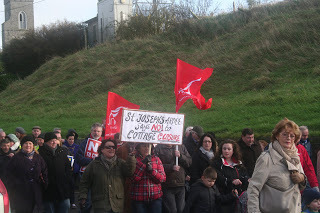
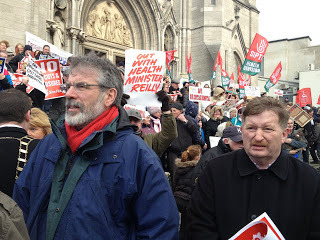
March and Rally in Drogheda
Yesterday afternoon (Saturday) this blog and several thousand people from the Drogheda and Ardee area attended a march and rally in Drogheda to protest at the threatened closure of the Cottage Hospital in the town. Under plans by the Fine Gael and Labour government it and St. Joseph's nursing home in Ardee are likely to close.
Both buildings are home to 33 long stay residents and a similar number of respite patients. In the course of a year the number of patients who receive respite is around 300.
The buildings are old. But the staff are professional, dedicated and caring and over the years both have developed a warm family closeness.
One resident in the Cottage Home is 97 years old and another has been there for over 30 years and many of the rest for a decade or more.
The threat to their home means that the residents are frightened by the prospect of a major move and the disintegration of their nursing home family.
I met many of residents and staff from both homes who braved a cold day to demonstrate their opposition to the government's cutback plans.
The large turnout is evidence of the huge affection the people of Drogheda have for the Cottage Hospital.
Inevitably in the arguments for and against closure all sorts of excuses are pedalled about by the government. Most often that older nursing homes are not fit for purpose. It is said that they are of poor standard and present a health risk to residents.
However this can't be said of the Cottage Hospital or St. Joseph's. Both have received regular inspections and have passed with flying colours. The Cottage has had 3 HIQUA inspections to date, and on all occasions it scored highly on clinical aspect and quality of care. HIQA reported that the hospital is SAFE, SECURE and SUITABLE.
So whatever the spin any decision to close this hospital has nothing to do with health and safety issues for patients and staff. It is quite simply a political decision based on the government's determination to pursue its austerity programme.
Citizens understand this. Events at the rally demonstrated this and showed public anger and rejection of austerity policies that deliberately target the weak and vulnerable. The Cottage Hospital Act Group had decided to ask all local TDs to sign a pledge of support for the nursing homes.
They also decided that they would not give speaking rights on their platform to any TD who refused to do this. This TD was pleased to pledge support. Fine Gael TDs Peter Fitzpatrick and Minister Fergus O Dowd, along with Labour TD Ged Nash refused to sign the pledge and amid shouts of anger from the crowd they were asked to leave the platform by the organising committee.
This blog would have allowed them to speak but this was not a Sinn Féin platform and the Action Group have the right to make their own decisions on this matter.
The three TDs in question should have signed the pledge.
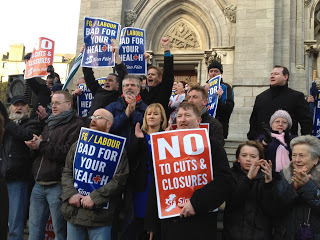
The context for this widespread public annoyance is to be found in the events of last November, before the budget, when government Ministers deliberately leaked budget proposals, including the possibility of closures to nursing homes. This irresponsible action frightened elderly residents across the state. Suddenly none of them could be sure that their homes were safe from closure.
This was then followed by a budget, and then a HSE plan which will strip €750 million out of the health service. This is on top of the €1 billion already cut by Fianna Fáil in the previous budget. The government target is to get rid of up to 900 beds in public nursing homes. This is at a time when our elderly population is increasing and the demand is growing. Up to 10 nursing homes might close.
The Minister for Health James Reilly excuses his actions by claiming that he wants to keep more elderly citizens in the community. But then he sets as one of his goals the reduction of the home help service by half a million hours this year. A complete contradiction!
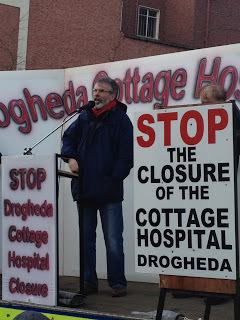
Last week in the Dáil this blog asked the Taoiseach to spell out his plans for nursing homes. I asked him to tell staff and residents whether he plans to cut their services; their jobs, their homes. He refused to do so. He did agree to hold a debate on health but that will be small comfort to residents of nursing homes.
Last Thursday morning a meeting was held involving local government TDs and the Minister. When I contacted the Ministers office and asked to attend I was refused. This runs against the normal protocol for such events and was a disgraceful decision by the Minister of a government which claims to be for greater openness and transparency and accountability.
Residents and staff need clarity and certainty, not waffle and spin. The government has a responsibility to speak plainly and provide real and proper information on its plans for public nursing homes.
This is no way to treat our elderly citizens. It is no way to treat committed staffs.
This blog believes that citizens have rights. The right to a job, to a home, to access to education and a health service that provides a wrap-around professional service from the cradle to the grave.
Society has a responsibility to look after citizens and especially those who are vulnerable or aged or ill. And government policy should reflect these core values.
Regrettably this governments core values, like the previous one, is motivated by profit and cutting public services.
It is not right that nursing homes and beds are to be cut to pay off the debts of the big bankers and developers. Next Wednesday Anglo Irish Bank will hand over €1.25 billion of taxpayers money to unguaranteed unsecured bondholders.
The government is under no moral or ethical or legal obligation to do this. That money could cover the cost of providing a first class nursing care service. A month later the government will hand over another €3.1 billion to the European Central Bank to pay off the debt of Anglo-Irish a criminal toxic bank.
Imagine how many nursing beds and emergency departments and schools that would pay for.
The truth is that the austerity policies which Fine Gael and Labour are wedded to are not working. Worse they are adding to the mess created by the previous government.
The evidence is all around us – mass emigration; mounting job losses; a health service on the rack - and one government decision after another imposing cuts on public services.
Recently, the government was forced to retreat on two issues – cuts to DEIS schools and funding for young people with disabilities. It u-turned on these issues because public support for the schools and young people and against
This government was forced to retreat on DEIS schools and on cutting support for young people with disabilities because of the level of public support for the schools and young people and opposition to government policy.
That is the lesson we must learn. If we are to stop the cuts to public nursing homes; if we are to protect the future of the Cottage Hospital and of St. Josephs in Ardee and any others that might be threatened, then we need to make our voices heard.
Next Saturday St. Josephs is holding a public rally. Regrettably I can't be there because of a long standing commitment to be in Derry however I would urge everyone who appreciates the work of nursing home staffs and is concerned at the treatment of elderly citizens to come along on Saturday and show your support for St. Josephs.
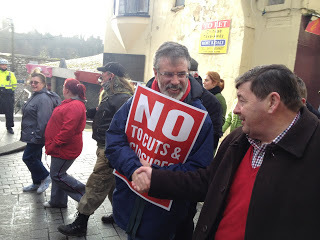
Published on January 22, 2012 15:25
January 19, 2012
Young people under attack by Labour
Last week it was DEIS schools. The Labour Minister for Education Ruairi Quinn had turned Labour party policy on its head and imposed major cuts to schools situated in disadvantaged area.
And while Sinn Féin TDs like Sean Crowe and Peadar Toibin lashed government education strategy in the Dáil it was the mounting public anger and pressure on Labour backbenchers that forced Quinn to do a volte face.
But that wasn't the Labour Minister's only bad decision.
In the education system in the 26 counties schools employ guidance counsellors, who are normally qualified teachers, to advise students and young people.
They cover three separate but interlinked areas including personal and social, education, and vocational guidance and counselling.
As part of his cost cutting programme Quinn decided that guidance counsellors will no longer be provided on an ex quota basis in secondary schools. The goal is to save €32 million annually. In practice this means that many school principals will have to transfer counsellors back into the class rooms to teaching subjects.
One counsellor I spoke to before Christmas told me that she began her teaching career 18 years ago and immediately became a full time guidance counsellor.
She has never taught the language she has her degree in but will now be expected to go into the classroom. But for many more it means the loss of their employment as between 700-1000 posts will be cut.
The reality is that the government's policies are not working. The evidence is all around us – mass emigration; mounting job losses; a health service on the rack - and one government decision after another imposing cuts on public services.
Ruairi Quinn's decision to cut resources to DEIS schools was an example of this.
Last week he admitted that this had been a mistake. But the truth is that it wasn't a mistake. It was a conscious decision taken by him – by a Labour Minister - to cut services to vulnerable young people.
In every society, as those of us who live in the real world will be aware, there are citizens who need a leg up. A fair society has an obligation to give them support.
A good Government, a visionary thoughtful Government, will supply this, protect it and build on it, while a unfair short-sighted Government will do the opposite.
The decision to cut resources to DEIS schools was an example of this. It was completely in keeping with the Government's commitment to austerity policies. This approach is aimed at forcing those who can least afford it to carry the greatest financial burden of the economic crisis.
This is also the reason the Government targeted disabled young people and DEIS schools and it is why services to our elderly are now being cut. It explains why Minister Quinn is determined to scrap up to 1,000 guidance counsellor posts.
The reality is that guidance counsellors are skilled professionals who provide an essential service to young people, their families and society.
Without the help of guidance counsellors students might pick the wrong courses.
Without guidance counsellors students from financially disadvantaged backgrounds who often apply to college through the higher education access route would have no one to help them fill in complex forms to avail of reduced points and assistance in college.
Without guidance counsellors students with learning or physical disabilities or mental health problems who apply through the disability access route would face similar hurdles.
Guidance counsellors also help students with ADD, ADHD, OCD and autism. They help students identify careers, which is particularly important during this recession.
They are also the first port of call for young people under threat or who are experiencing difficulties with their mental well-being.
One guidance counsellor from County Louth outlined for me some of the issues she has dealt with in recent times. Incidents included self-harm, rape, family breakdown, bullying, eating disorders, child neglect, alcoholism in families, drug abuse and mental health issues. At a time when self-harm and suicide are increasing, who will help these students if guidance counsellors are not available?
It is also likely that cuts will result in the privatisation of guidance counselling. For those who can afford private counselling this will not prove an insurmountable difficulty.
However, those who cannot afford private guidance counsellors will not get help on any of the issues I have mentioned. This means that students from low and middle income homes will be at an even greater disadvantage.
The notion of two Irelands is becoming apparent. The Labour Party used to have a slogan, "one Ireland", even if its Ireland stopped at the Border. We are not seeing the emergence of a sense of one Ireland. Rather we are seeing two Irelands, namely, those at the bottom and the rest of us.
On Tuesday and Wednesday the Dail debated a private members motion on this issue seeking a reversal of the cuts. All of these points were made by this blog and others. Once again Labour backbenchers were discomforted but they voted down the motion.
And this time there is no sense that the Labour Minister for Education will acknowledge another mistake and change tack.
And while Sinn Féin TDs like Sean Crowe and Peadar Toibin lashed government education strategy in the Dáil it was the mounting public anger and pressure on Labour backbenchers that forced Quinn to do a volte face.
But that wasn't the Labour Minister's only bad decision.
In the education system in the 26 counties schools employ guidance counsellors, who are normally qualified teachers, to advise students and young people.
They cover three separate but interlinked areas including personal and social, education, and vocational guidance and counselling.
As part of his cost cutting programme Quinn decided that guidance counsellors will no longer be provided on an ex quota basis in secondary schools. The goal is to save €32 million annually. In practice this means that many school principals will have to transfer counsellors back into the class rooms to teaching subjects.
One counsellor I spoke to before Christmas told me that she began her teaching career 18 years ago and immediately became a full time guidance counsellor.
She has never taught the language she has her degree in but will now be expected to go into the classroom. But for many more it means the loss of their employment as between 700-1000 posts will be cut.
The reality is that the government's policies are not working. The evidence is all around us – mass emigration; mounting job losses; a health service on the rack - and one government decision after another imposing cuts on public services.
Ruairi Quinn's decision to cut resources to DEIS schools was an example of this.
Last week he admitted that this had been a mistake. But the truth is that it wasn't a mistake. It was a conscious decision taken by him – by a Labour Minister - to cut services to vulnerable young people.
In every society, as those of us who live in the real world will be aware, there are citizens who need a leg up. A fair society has an obligation to give them support.
A good Government, a visionary thoughtful Government, will supply this, protect it and build on it, while a unfair short-sighted Government will do the opposite.
The decision to cut resources to DEIS schools was an example of this. It was completely in keeping with the Government's commitment to austerity policies. This approach is aimed at forcing those who can least afford it to carry the greatest financial burden of the economic crisis.
This is also the reason the Government targeted disabled young people and DEIS schools and it is why services to our elderly are now being cut. It explains why Minister Quinn is determined to scrap up to 1,000 guidance counsellor posts.
The reality is that guidance counsellors are skilled professionals who provide an essential service to young people, their families and society.
Without the help of guidance counsellors students might pick the wrong courses.
Without guidance counsellors students from financially disadvantaged backgrounds who often apply to college through the higher education access route would have no one to help them fill in complex forms to avail of reduced points and assistance in college.
Without guidance counsellors students with learning or physical disabilities or mental health problems who apply through the disability access route would face similar hurdles.
Guidance counsellors also help students with ADD, ADHD, OCD and autism. They help students identify careers, which is particularly important during this recession.
They are also the first port of call for young people under threat or who are experiencing difficulties with their mental well-being.
One guidance counsellor from County Louth outlined for me some of the issues she has dealt with in recent times. Incidents included self-harm, rape, family breakdown, bullying, eating disorders, child neglect, alcoholism in families, drug abuse and mental health issues. At a time when self-harm and suicide are increasing, who will help these students if guidance counsellors are not available?
It is also likely that cuts will result in the privatisation of guidance counselling. For those who can afford private counselling this will not prove an insurmountable difficulty.
However, those who cannot afford private guidance counsellors will not get help on any of the issues I have mentioned. This means that students from low and middle income homes will be at an even greater disadvantage.
The notion of two Irelands is becoming apparent. The Labour Party used to have a slogan, "one Ireland", even if its Ireland stopped at the Border. We are not seeing the emergence of a sense of one Ireland. Rather we are seeing two Irelands, namely, those at the bottom and the rest of us.
On Tuesday and Wednesday the Dail debated a private members motion on this issue seeking a reversal of the cuts. All of these points were made by this blog and others. Once again Labour backbenchers were discomforted but they voted down the motion.
And this time there is no sense that the Labour Minister for Education will acknowledge another mistake and change tack.
Published on January 19, 2012 20:55
January 15, 2012
Austerity is not working
It seems like every time you turn on the news or open a newspaper there is a new crisis in the Eurozone. Last Friday' decision by the credit rating agency Standard and Poor (an ironic name for such a body in the current context) downgraded France's AAA credit rating. It also lowered that of 8 other European nations.
The immediate consequence of this was for stock markets and the value of the Euro to drop.
This blog and other comrades will be meeting the Troika representatives, who are currently in Dublin, on Monday afternoon. It will be our second meeting with the Troika. For those readers unfamiliar with the term the Troika is the title given to the International Monetary Fund/European Central Bank and European Union bodies that have provided the bailout fund to the Irish government. They are in Dublin to check the government's books and to make sure that it is keeping to the austerity programme that the previous Fianna Fáil led government entered into.
The purpose of our meeting with the Troika is to provide Sinn Féin with an opportunity to spell out our strongly held view that their programme is not working and that its implementation by the Fine Gael/Labour government is causing huge distress for citizens.
One example of this will come into effect tomorrow when the government decision to eliminate concurrent payments for new participants in Community Employment schemes comes into effect. This move also includes cutting the qualified child payment for existing lone parent CE participants by €29.80 per child per week.
It was the special arrangements for lone parents on Community Employment schemes which made this project work for lone parents who wanted to get back into the job market.
The government's cuts will put Community Employment schemes out of reach of most lone parents. It is another example of the government's December budget that protected the wealthy while penalising low and middle income families, the poor and disadvantaged.
The reality is that the government's policies are not working. This is evident in the unprecedented levels of unemployment; the numbers of young people that are immigrating; the crisis in our health and education systems; the attack on our public services; the debacle around pensions, and the huge distress for individuals and families.
Austerity is not working. The domestic economy is on the floor.
People are worried about paying their bills, putting food on the table and keeping a roof over their heads. The failure of this government to defend workers rights has also created a climate in which employers believe they can abuse workers. Employees at Vita Cortex in Cork and the La Sensa retail chain were denied their redundancy payments. Both engaged in sit-ins in an effort to get the money owed to them. The La Sensa workers, with the solidarity support of many people, successfully secured their redundancy money. The Vita Cortex workers are still battling.
Fine Gael and Labour also plan to hand €1.2 billion of taxpayers money over to unguaranteed unsecured bondholders on January 25th. The government will also pay out €3.1 billion in March to a toxic bank – Irish Bank Resolution Corporation, formerly known as Anglo.
Citizens are paying for the greed of bankers and the bad policies of the former Fianna Fail/Green government.
The €4 billion that this government will give away in the next three months is more than the €3.8 billion in cuts and new taxes it introduced in December. This government, both Fine Gael and Labour, is ideologically committed to austerity and plans as part of the Fiscal Compact agreed with the other EU governments, to write this into the constitution locking future governments into austerity programme.
The government's policy is wrong and short sighted. The money being handed over to unsecured and unguaranteed bondholders and toxic banks should instead be used to retain jobs, create new jobs, run our public services and stimulate growth in the economy.
Our conversation with the Troika will be an opportunity to raise these issues and to challenge the government's excuse that is no alternative to the austerity programme, and we will explore with the Troika how much room for manoeuvre there actually is.
For example, what is their view of investing a portion of the National Pension Reserve Fund into job creation and economic recovery? What is their view of progressive tax reform that places the burden on those most able to pay rather than low and middle-income families? What is their view on the future of the Anglo Irish promissory note? And do they believe that Ireland will be able to return to the markets fully in 2013 on the basis of current trends?
People are only beginning to fully understand the impact of the cuts and extra charged meted out in December's budget by Fine Gael and Labour. For many 2012 will be a year of increased hardship. Sinn Féin wants to demonstrate that there is an alternative, that there is hope.
The immediate consequence of this was for stock markets and the value of the Euro to drop.
This blog and other comrades will be meeting the Troika representatives, who are currently in Dublin, on Monday afternoon. It will be our second meeting with the Troika. For those readers unfamiliar with the term the Troika is the title given to the International Monetary Fund/European Central Bank and European Union bodies that have provided the bailout fund to the Irish government. They are in Dublin to check the government's books and to make sure that it is keeping to the austerity programme that the previous Fianna Fáil led government entered into.
The purpose of our meeting with the Troika is to provide Sinn Féin with an opportunity to spell out our strongly held view that their programme is not working and that its implementation by the Fine Gael/Labour government is causing huge distress for citizens.
One example of this will come into effect tomorrow when the government decision to eliminate concurrent payments for new participants in Community Employment schemes comes into effect. This move also includes cutting the qualified child payment for existing lone parent CE participants by €29.80 per child per week.
It was the special arrangements for lone parents on Community Employment schemes which made this project work for lone parents who wanted to get back into the job market.
The government's cuts will put Community Employment schemes out of reach of most lone parents. It is another example of the government's December budget that protected the wealthy while penalising low and middle income families, the poor and disadvantaged.
The reality is that the government's policies are not working. This is evident in the unprecedented levels of unemployment; the numbers of young people that are immigrating; the crisis in our health and education systems; the attack on our public services; the debacle around pensions, and the huge distress for individuals and families.
Austerity is not working. The domestic economy is on the floor.
People are worried about paying their bills, putting food on the table and keeping a roof over their heads. The failure of this government to defend workers rights has also created a climate in which employers believe they can abuse workers. Employees at Vita Cortex in Cork and the La Sensa retail chain were denied their redundancy payments. Both engaged in sit-ins in an effort to get the money owed to them. The La Sensa workers, with the solidarity support of many people, successfully secured their redundancy money. The Vita Cortex workers are still battling.
Fine Gael and Labour also plan to hand €1.2 billion of taxpayers money over to unguaranteed unsecured bondholders on January 25th. The government will also pay out €3.1 billion in March to a toxic bank – Irish Bank Resolution Corporation, formerly known as Anglo.
Citizens are paying for the greed of bankers and the bad policies of the former Fianna Fail/Green government.
The €4 billion that this government will give away in the next three months is more than the €3.8 billion in cuts and new taxes it introduced in December. This government, both Fine Gael and Labour, is ideologically committed to austerity and plans as part of the Fiscal Compact agreed with the other EU governments, to write this into the constitution locking future governments into austerity programme.
The government's policy is wrong and short sighted. The money being handed over to unsecured and unguaranteed bondholders and toxic banks should instead be used to retain jobs, create new jobs, run our public services and stimulate growth in the economy.
Our conversation with the Troika will be an opportunity to raise these issues and to challenge the government's excuse that is no alternative to the austerity programme, and we will explore with the Troika how much room for manoeuvre there actually is.
For example, what is their view of investing a portion of the National Pension Reserve Fund into job creation and economic recovery? What is their view of progressive tax reform that places the burden on those most able to pay rather than low and middle-income families? What is their view on the future of the Anglo Irish promissory note? And do they believe that Ireland will be able to return to the markets fully in 2013 on the basis of current trends?
People are only beginning to fully understand the impact of the cuts and extra charged meted out in December's budget by Fine Gael and Labour. For many 2012 will be a year of increased hardship. Sinn Féin wants to demonstrate that there is an alternative, that there is hope.
Published on January 15, 2012 17:24
January 13, 2012
Failing to cherish the Young
Wednesday was the first day of the new Dáil term for 2012. As they returned from their Christmas break TDs and Seanadoirí were met by a large and vocal demonstration of parents, children and staff from DEIS schools across the state.
'Delivering Equality of Opportunity in Schools' (DEIS) is an initiative which provides essential support for children from disadvantaged backgrounds and those with Special Educational Needs so that they are able to leave school with the skills necessary to fully participate in the social and economic activities of society and to live independent and fulfilled lives.
There are over 300 such schools and according to the Department of Education they should "receive a greater level of support in terms of pupil-teacher ratios, special grants and extra support for pupils".
However, in its December budget the government introduced a number of measures which are about saving money by cutting resources to these schools. These measures include increasing class sizes; cutting a number of administrative principals; ending the support teacher scheme, and transferring up to 250 teachers in DEIS schools to mainstream schools.
It is estimated that up to 428 DEIS teaching posts from 270 primary and 163 post primary schools will be lost.
On Wednesday evening the first private member motion of the new term was a Sinn Féin motion calling on the government to rescind its decisions and to ring fence funding and support for DEIS schools.
A few hours before the debate was due to commence the Labour Minister Ruairi Quinn moved to try and ease Labour backbench unhappiness with the cuts by saying that he would hold a review into each school individually and complete that within 4 weeks. Some Labour TDs took this as an indication that the cuts will be reversed.
However, the Minister who had the opportunity to confirm this refused to do so.
Alarm bells immediately went off, not just among Sinn Féin and other opposition TDs but also campaigners seeking a reversal of the budget decision.
For many this smacked of the 'old politics' of divide and conquer. It's the cynical tactic of holding out the prospect of the Minister possibly making a few concessions and trying to strip away the urgency and dynamic and solidarity of the campaign for a reversal of the cuts.
Cynicism increased when the Minister went on to RTE on Friday morning and admitted that he had 'made a mistake' but warned of different cuts in education if he had to reverse any cuts to DEIS schools.
"I'm out of practice" he said. Out of Practice? What sort of explanation is that to give?
What is needed is not a review or shallow excuses but a reversal of the decision. That is why the Irish National Teachers Organisation is right to go ahead with its planned protest next Thursday.
There is abundant evidence supporting the positive and productive work of these schools. The publication on Friday of a report on the first phase of the DEIS programme in primary schools confirms this. The report published by the Education Research Centre covers the years 2007 to 2010 and reveals significantly higher scores in reading and mathematics.
The Minister has added significantly to the confusion and uncertainty and fear that exists among parents, pupils and teaching staff. His decisions and actions have been unacceptable. He should move now to immediately reverse the threatened cuts to DEIS schools.
However he failed to do so and one after another Labour party backbenchers walked through the lobby and vote to pursue the current government agenda.
It is a far cry from the Proclamation and cherishing all of the children of the nation equally.
What would James Connolly, whose bust looks down on the Dáil chamber, have done if faced with this decision? I am confident he would not have voted to cut essential resources from schools in disadvantaged areas.
And what will citizens, particularly those who support Labour, think when they watch a Labour Minister force teachers onto the dole queues and penalise disadvantaged children?
The Labour Party claimed that Labour in government was needed to take the sharp edge off Fine Gael's conservatism. It isn't working. Labour has bought into Fine Gael's austerity and conservative ethos. Sinn Féin is actively encouraging teachers and parents and others aggrieved at Labour behaviour to lobby backbenchers, especially Labour backbenchers. They are now being forced to take the sharp edge of their leadership's conservatism.
The fact is that the Labour Minister for Education took the decision to cut resources to DEIS schools without any thought to the social consequences, hopes and opportunities in the lives of these young people?
While his decision may save a minimal amount of money future outcomes will mean that society will lose out ten times over.
Leaving aside the politics, the ideological position and the morality of it all, it is bad economics because in time the State will need to pay more to pick up on the social legacy left by these cuts.
Another matter of real concern are the cuts to guidance councillors. As well as the career guidance such councillors give they are the first port of call for many children with difficulties in their lives. That has also been dismantled, which is very short-sighted.
Equality, equality, equality: where is the equality in any of this?
The government's cuts will copperfasten inequality. We will see emerging in this State two different types of Ireland, namely, the people of the bottom of the ladder, who have not emigrated or are now on the dole, will be cemented into their inequality while those at the top of the tier will have their positions reinforced.
This should not be reduced to a matter of money particularly by a Government which will by March have given €4.3 billion of taxpayers' money to criminal banks and unguaranteed bondholders.
This blog knows, as a representative of County Louth and from all of my experience in west Belfast, the huge effect which small amounts of money can have on disadvantaged areas in terms of uplifting possibilities and opportunities, in particular of young people.
Let us not consign another generation of people to a life on the dole or to emigration.
Mol an óige agus tiocfaidh sí. Even those who have only Gaeilge bhriste know the sense and wisdom of that proverb. Mol an óige agus tiocfaidh sí. Nourish the young and they will come right. Do the opposite and we create problems for ourselves.
'Delivering Equality of Opportunity in Schools' (DEIS) is an initiative which provides essential support for children from disadvantaged backgrounds and those with Special Educational Needs so that they are able to leave school with the skills necessary to fully participate in the social and economic activities of society and to live independent and fulfilled lives.
There are over 300 such schools and according to the Department of Education they should "receive a greater level of support in terms of pupil-teacher ratios, special grants and extra support for pupils".
However, in its December budget the government introduced a number of measures which are about saving money by cutting resources to these schools. These measures include increasing class sizes; cutting a number of administrative principals; ending the support teacher scheme, and transferring up to 250 teachers in DEIS schools to mainstream schools.
It is estimated that up to 428 DEIS teaching posts from 270 primary and 163 post primary schools will be lost.
On Wednesday evening the first private member motion of the new term was a Sinn Féin motion calling on the government to rescind its decisions and to ring fence funding and support for DEIS schools.
A few hours before the debate was due to commence the Labour Minister Ruairi Quinn moved to try and ease Labour backbench unhappiness with the cuts by saying that he would hold a review into each school individually and complete that within 4 weeks. Some Labour TDs took this as an indication that the cuts will be reversed.
However, the Minister who had the opportunity to confirm this refused to do so.
Alarm bells immediately went off, not just among Sinn Féin and other opposition TDs but also campaigners seeking a reversal of the budget decision.
For many this smacked of the 'old politics' of divide and conquer. It's the cynical tactic of holding out the prospect of the Minister possibly making a few concessions and trying to strip away the urgency and dynamic and solidarity of the campaign for a reversal of the cuts.
Cynicism increased when the Minister went on to RTE on Friday morning and admitted that he had 'made a mistake' but warned of different cuts in education if he had to reverse any cuts to DEIS schools.
"I'm out of practice" he said. Out of Practice? What sort of explanation is that to give?
What is needed is not a review or shallow excuses but a reversal of the decision. That is why the Irish National Teachers Organisation is right to go ahead with its planned protest next Thursday.
There is abundant evidence supporting the positive and productive work of these schools. The publication on Friday of a report on the first phase of the DEIS programme in primary schools confirms this. The report published by the Education Research Centre covers the years 2007 to 2010 and reveals significantly higher scores in reading and mathematics.
The Minister has added significantly to the confusion and uncertainty and fear that exists among parents, pupils and teaching staff. His decisions and actions have been unacceptable. He should move now to immediately reverse the threatened cuts to DEIS schools.
However he failed to do so and one after another Labour party backbenchers walked through the lobby and vote to pursue the current government agenda.
It is a far cry from the Proclamation and cherishing all of the children of the nation equally.
What would James Connolly, whose bust looks down on the Dáil chamber, have done if faced with this decision? I am confident he would not have voted to cut essential resources from schools in disadvantaged areas.
And what will citizens, particularly those who support Labour, think when they watch a Labour Minister force teachers onto the dole queues and penalise disadvantaged children?
The Labour Party claimed that Labour in government was needed to take the sharp edge off Fine Gael's conservatism. It isn't working. Labour has bought into Fine Gael's austerity and conservative ethos. Sinn Féin is actively encouraging teachers and parents and others aggrieved at Labour behaviour to lobby backbenchers, especially Labour backbenchers. They are now being forced to take the sharp edge of their leadership's conservatism.
The fact is that the Labour Minister for Education took the decision to cut resources to DEIS schools without any thought to the social consequences, hopes and opportunities in the lives of these young people?
While his decision may save a minimal amount of money future outcomes will mean that society will lose out ten times over.
Leaving aside the politics, the ideological position and the morality of it all, it is bad economics because in time the State will need to pay more to pick up on the social legacy left by these cuts.
Another matter of real concern are the cuts to guidance councillors. As well as the career guidance such councillors give they are the first port of call for many children with difficulties in their lives. That has also been dismantled, which is very short-sighted.
Equality, equality, equality: where is the equality in any of this?
The government's cuts will copperfasten inequality. We will see emerging in this State two different types of Ireland, namely, the people of the bottom of the ladder, who have not emigrated or are now on the dole, will be cemented into their inequality while those at the top of the tier will have their positions reinforced.
This should not be reduced to a matter of money particularly by a Government which will by March have given €4.3 billion of taxpayers' money to criminal banks and unguaranteed bondholders.
This blog knows, as a representative of County Louth and from all of my experience in west Belfast, the huge effect which small amounts of money can have on disadvantaged areas in terms of uplifting possibilities and opportunities, in particular of young people.
Let us not consign another generation of people to a life on the dole or to emigration.
Mol an óige agus tiocfaidh sí. Even those who have only Gaeilge bhriste know the sense and wisdom of that proverb. Mol an óige agus tiocfaidh sí. Nourish the young and they will come right. Do the opposite and we create problems for ourselves.
Published on January 13, 2012 19:55
January 7, 2012
Thatcher's War Policy in Ireland
The recent publication of British government papers from 1981 have reminded many people of the negative role played by British Prime Minister Margaret Thatcher at that time.
The papers were published coinicdnetly at the same as a Hollywood movie about Thatcher.
I haven't seen the film but I do remember the Thatcher years and the great hurt she did to the British people and also to the people of this island.
Thatcher's right wing conservative social and economic politics – often labelled Thatcherism - were a source of considerable division in Britain. Along with US President Ronald Reagan she championed the deregulation of the financial institutions, cuts in public services and was vehemently anti-trade union. The current crisis in the banking institutions and the economic recession owe much to these policies.
She also went to war in the Malvinas pursuing Britain's age old colonial interests; opposed sanctions against apartheid South Africa; and supported the Khmer Rouge and the Chilean dictator Pinochet.
Thatcher inherited a British counter-insurgency strategy in Ireland from the Labour government. Its goal was to politically defeat Irish republicanism.
The Thatcher government embraced this strategy. It believed that the criminalisation of the republican prisoners would break the republican struggle. It was not interested in a resolution.
This much is evident in the government papers. For example a report of a meeting at Chequers on May 27th, after the deaths of Bobby Sands, Francie Hughes, Raymond McCreesh and Patsy O Hara, describes Thatcher commenting that 'the Government must be 'rock solid' against any concessions to the hunger strikers or PIRA.'
The following day on a visit to Belfast Thatcher declared that the hunger strike 'may well be their [the IRA's] last card.'
At a later meeting on July 3rd a paper notes that: 'The PM said that she felt that no concession could be made to the hunger strikers in any way...The Government's main aim should be to demonstrate that the blame for the hunger strike lay with the strikers themselves, rather than with the alleged inflexibility of the Government.'
At the same time as she was publicly engaged in the trenchant rhetoric that characterised her term in office the 'iron lady' was also involved in secret discussions through a Derry based 'back-channel' – code-named 'Soon' - with the Sinn Féin leadership.
It was a cumbersome process of contact open to abuse. The British state papers raise serious questions about the motivation of the British and the relationship between London and 'Soon'.
In a paper dated July 21st the British state: 'The use of the channel has ensured that the Provisionals have been left in no doubt that our public statements are our true position, and not a negotiating gambit...The channel has also been a source of additional intelligence about the Provisionals' attitude which we could not get in any other way…'
Outside the H-Blocks Thatcher's intransigence saw an escalation in conflict in the summer of 1981 with almost fifty people killed on the streets.
The electoral intervention of H-Block prisoners in the June general election saw Paddy Agnew and hunger striker Kieran Doherty elected as TDs. Since that election no single party has been able to form a government.
The events of that awful summer of '81 polarised Irish society, north and south. The Thatcher government policy during the 1980's was little more than a war policy. All of the strategies issuing from that policy were aimed at defeating or isolating republicanism. This included the shallow and ineffectual 1985 Anglo-Irish Agreement which was about creating a political alliance involving the Dublin establishment, the SDLP, and the British to defeat Irish republicanism. Margaret Thatcher was a prime mover in all of this.
Under her direction collusion between British state forces and unionist death squads increased. In 1982 the Force Research Unit (FRU) was established. FRU ran British agents inside the various loyalist paramilitary groups and provided information on nationalists and republicans to be murdered. FRU and British intelligence also facilitated the importation of weapons for the UDA, UVF and Ulster Resistance via the apartheid regime in South Africa in early 1988.
In the three years prior to receiving these weapons loyalists killed 34 people. In the three years after the shipment they killed 224.
Among those to die was human rights lawyer Pat Finucane. On January 17th 1989 one of Thatcher's Ministers Douglas Hogg told the British House of Commons that some solicitors in the north were 'unduly sympathetic to the cause of the IRA'. Three weeks later Pat Finucane was shot dead by a UDA squad made up entirely of Special Branch and British agents.
Shoot-to-kill actions by British forces also significantly increased. This was most evident in the shooting dead of three unarmed IRA activists in Gibraltar in March 1988. It is my view that Thatcher authorised the killings at Gibraltar.
Later when the BBC and the IBA scheduled two programmes about Gibraltar Thatcher tried to stop them. She was "outraged" when the programmes went ahead. Later that year she introduced the Broadcasting Ban on Sinn Féin.
Three years later Thatcher authorised the then British Secretary of State Peter Brooke to reopen the back-channel with republicans. We were wary of this. However, for almost a decade Sinn Féin had been patently trying to build a peace process and unfolding events on the world stage, including the dismantling of the Berlin Wall and the reunification of Germany, and the release of Nelson, were evidence that governments, and apparently intractable situations, could change. So we agreed to reactivate the back channel.
But for Thatcher it all ended several months later in November 1990 when she was forced to resign by her party who perceived her to be no longer an electoral asset. She was evicted from Downing Street with all the ruthlessness, treachery and warped humanity of what passes for high politics.
Thatcher's 12 years of dictating British policy in Ireland was a legacy of bitterness and entrenched division.
The papers were published coinicdnetly at the same as a Hollywood movie about Thatcher.
I haven't seen the film but I do remember the Thatcher years and the great hurt she did to the British people and also to the people of this island.
Thatcher's right wing conservative social and economic politics – often labelled Thatcherism - were a source of considerable division in Britain. Along with US President Ronald Reagan she championed the deregulation of the financial institutions, cuts in public services and was vehemently anti-trade union. The current crisis in the banking institutions and the economic recession owe much to these policies.
She also went to war in the Malvinas pursuing Britain's age old colonial interests; opposed sanctions against apartheid South Africa; and supported the Khmer Rouge and the Chilean dictator Pinochet.
Thatcher inherited a British counter-insurgency strategy in Ireland from the Labour government. Its goal was to politically defeat Irish republicanism.
The Thatcher government embraced this strategy. It believed that the criminalisation of the republican prisoners would break the republican struggle. It was not interested in a resolution.
This much is evident in the government papers. For example a report of a meeting at Chequers on May 27th, after the deaths of Bobby Sands, Francie Hughes, Raymond McCreesh and Patsy O Hara, describes Thatcher commenting that 'the Government must be 'rock solid' against any concessions to the hunger strikers or PIRA.'
The following day on a visit to Belfast Thatcher declared that the hunger strike 'may well be their [the IRA's] last card.'
At a later meeting on July 3rd a paper notes that: 'The PM said that she felt that no concession could be made to the hunger strikers in any way...The Government's main aim should be to demonstrate that the blame for the hunger strike lay with the strikers themselves, rather than with the alleged inflexibility of the Government.'
At the same time as she was publicly engaged in the trenchant rhetoric that characterised her term in office the 'iron lady' was also involved in secret discussions through a Derry based 'back-channel' – code-named 'Soon' - with the Sinn Féin leadership.
It was a cumbersome process of contact open to abuse. The British state papers raise serious questions about the motivation of the British and the relationship between London and 'Soon'.
In a paper dated July 21st the British state: 'The use of the channel has ensured that the Provisionals have been left in no doubt that our public statements are our true position, and not a negotiating gambit...The channel has also been a source of additional intelligence about the Provisionals' attitude which we could not get in any other way…'
Outside the H-Blocks Thatcher's intransigence saw an escalation in conflict in the summer of 1981 with almost fifty people killed on the streets.
The electoral intervention of H-Block prisoners in the June general election saw Paddy Agnew and hunger striker Kieran Doherty elected as TDs. Since that election no single party has been able to form a government.
The events of that awful summer of '81 polarised Irish society, north and south. The Thatcher government policy during the 1980's was little more than a war policy. All of the strategies issuing from that policy were aimed at defeating or isolating republicanism. This included the shallow and ineffectual 1985 Anglo-Irish Agreement which was about creating a political alliance involving the Dublin establishment, the SDLP, and the British to defeat Irish republicanism. Margaret Thatcher was a prime mover in all of this.
Under her direction collusion between British state forces and unionist death squads increased. In 1982 the Force Research Unit (FRU) was established. FRU ran British agents inside the various loyalist paramilitary groups and provided information on nationalists and republicans to be murdered. FRU and British intelligence also facilitated the importation of weapons for the UDA, UVF and Ulster Resistance via the apartheid regime in South Africa in early 1988.
In the three years prior to receiving these weapons loyalists killed 34 people. In the three years after the shipment they killed 224.
Among those to die was human rights lawyer Pat Finucane. On January 17th 1989 one of Thatcher's Ministers Douglas Hogg told the British House of Commons that some solicitors in the north were 'unduly sympathetic to the cause of the IRA'. Three weeks later Pat Finucane was shot dead by a UDA squad made up entirely of Special Branch and British agents.
Shoot-to-kill actions by British forces also significantly increased. This was most evident in the shooting dead of three unarmed IRA activists in Gibraltar in March 1988. It is my view that Thatcher authorised the killings at Gibraltar.
Later when the BBC and the IBA scheduled two programmes about Gibraltar Thatcher tried to stop them. She was "outraged" when the programmes went ahead. Later that year she introduced the Broadcasting Ban on Sinn Féin.
Three years later Thatcher authorised the then British Secretary of State Peter Brooke to reopen the back-channel with republicans. We were wary of this. However, for almost a decade Sinn Féin had been patently trying to build a peace process and unfolding events on the world stage, including the dismantling of the Berlin Wall and the reunification of Germany, and the release of Nelson, were evidence that governments, and apparently intractable situations, could change. So we agreed to reactivate the back channel.
But for Thatcher it all ended several months later in November 1990 when she was forced to resign by her party who perceived her to be no longer an electoral asset. She was evicted from Downing Street with all the ruthlessness, treachery and warped humanity of what passes for high politics.
Thatcher's 12 years of dictating British policy in Ireland was a legacy of bitterness and entrenched division.
Published on January 07, 2012 15:26
Gerry Adams's Blog
- Gerry Adams's profile
- 29 followers
Gerry Adams isn't a Goodreads Author
(yet),
but they
do have a blog,
so here are some recent posts imported from
their feed.



